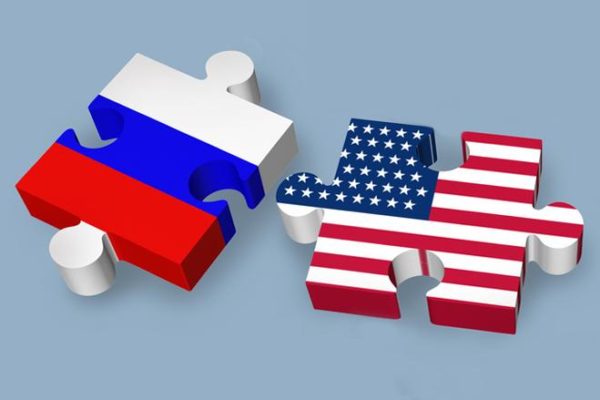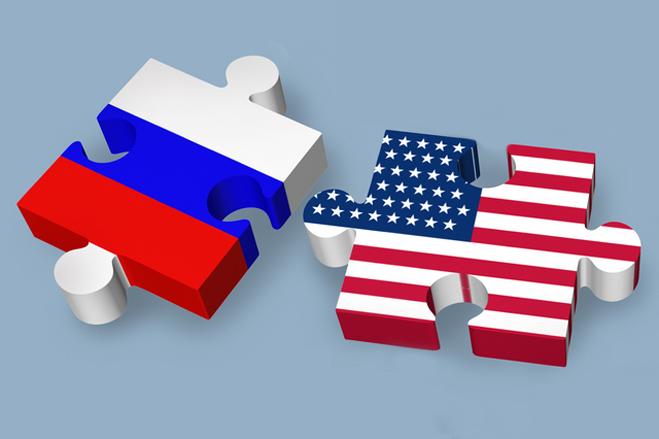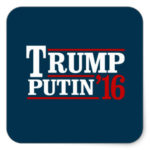This is part 2 of 2 in an examination of shifting US-Russia relations and that shift’s impact on the world. For part 1, click here

Photo credit: Getty Images
In the weeks since I published part one of this piece, news about President Trump’s subordinates history of contact with the Russians has dominated the headlines. Both former National Security Advisor Michael Flynn and Attorney General Jeff Sessions have been caught failing to disclose their communication with the Russian ambassador to the United States Sergei Kislyak, the revelation of which lead to the resignation of Flynn and Sessions’ recusal from investigating the Russia connection. [1][2] Subsequently, others in the President’s orbit have either admitted to or were discovered to have met with various Russian agents, such as Trump foreign policy advisor Carter Page [3], to his son-in-law Jared Kushner [4]. We also know that Secretary of State Rex Tillerson received the Order of Friendship, the highest civilian award the Russian government gives to foreign nationals [5]. But before we get caught in the weeds of the big names who spoke with a Russian, we should pause to think about what was discussed, because despite media attention, it is not a crime to talk to Russians. Even if they are the head of the FSB, the Russian security agency born out of the remains of the KGB, the mere conversation is not a crime. What was discussed, however, may be criminal, and it is to this that I turn my attention to.
Since taking office, most forces in the media and government have focused on how the Trump campaign may have colluded with Russian officials and agents operating on behalf of the Kremlin, such as WikiLeaks, to sway American sentiments against Hillary Clinton. However, lost in the smoke of Russian interference allegations is the fact that US foreign policy is being twisted into shapes that benefit the Kremlin. The budget proposal recently released by the President includes a 28% cut to the State Department and the US Agency for International Development or USAID. These cuts are ostensibly set to patch the hole created by a $54 billion increase in defence spending, yet such drastic reductions to the US diplomatic corp will gut its ability to support groups that agitate for human rights, cripple its ability to message internationally, and hamper its goal to bolster pro-American sentiment in foreign countries through foreign aid. From an America vs. Russia perspective, the crippling of the State Department, and the firing of much of its long-term staff, removes one of the American barriers to Russian expansionism into Europe and the Middle East and cripples any human rights groups working in Russia to advance rights issues for ethnic and sexual minorities. Now, it is very plausible that the cuts are simply to offset the massive defence spending increase, but it is worth noting that cuts to the State Department were opposed by Defence Secretary Mattis in 2013. [6] Now, nobody can say for sure that discussions between Kremlin agents and the Trump campaign led to any of these actions, but we do know that since the November election, that 6 high level Russian diplomats have met violent deaths [7], that Flynn and Kislyak did discuss sanctions [8], and that the Trump administration admitted to personal involvement in removing pro-Ukraine language from the party platform at the RNC in Cleveland [9]. At this point it would seem that we need to look at what would motivate the Russian Federation to entangle itself so deeply in our election, especially seeing as the blowback of the allegations alone is hampering Trump’s ability to lift sanctions, if that was the goal to begin with.
Fundamental to understanding Russian motivations behind such moves is an understanding of international relations, specifically, the concept of geopolitical anarchy. Put simply, geopolitical anarchy means that there are no objective rules in how countries are to relate to one another. For all the talk of human rights, international norms, and institutions, there is nothing within our reality that prevents an actor from doing something other than the resources available, the willingness of more powerful states to tolerate it, and the laws of physics. If a world leader decides to bomb and massacre the largest city in their country, the only entities capable of policing that leader are stronger entities. However, if powerful entities line up on each side, the world has two options: let the offense slide with limited or no punishment or unleash another world war. And that is the crux of the ultimate geopolitical vendetta, how do powerful countries police other powerful countries without a devastating war or final arbiter?
Though countries throughout the world answer this question in various ways, I will focus on the methods of the United States and the Russian Federation. Since the end of the Cold War, the US has been the undisputed leader on the world stage. No country has ever been so dominant, economically, militarily, or culturally. The US has used its position to advance trade deals that benefit US consumers through cheaper consumer goods and corporations through higher profits, made military deals that benefit defence contractors and create jobs from defence manufacturing, and international banking and trade organisations that smooth the process over. In addition, the US’ role in creating NATO and the UN and in rebuilding Western Europe, South Korea, and Japan after WWII has given it a cadre of allies that use their multilateral strength to advance mutual interests in democracy, free trade, and open markets. In International Relations (IR) jargon, these developments fall into the umbrella of Liberal Institutionalism, which idealises the use of alliances and diplomatic institutions to prevent wars between great powers and expand economic freedoms throughout the world.
In IR theory, the opposite of Liberal Institutionalism is Realism, or the idea that powerful countries use whatever means -alone or otherwise- to obtain and maintain power. However, the Russians are not purely realist. just like the US does not always act in ways that completely align with its Europe allies or even its own stated ideals. Since the end of the Cold War, the Russians have felt increasingly isolated and cornered by the expansion of NATO and the European Union into countries that it historically controlled, such as Poland, the Baltic States, and Czechia (the new English-language name of the Czech Republic). To that end, in order to reemerge as a global power on par with the West, Vladamir Putin and the Russians have taken aims to bolster its allies by forming the Commonwealth of Independent States and other multilateral institutions for free trade with the former Soviet states still allied with it. On top of that Russia has been loathe to see countries in its orbit drift closer to the West, which is why it became involved in Ukraine and annexed Crimea, a region that had historically been part of Russia proper until given to Ukraine in the 1954 by then Soviet Premier Nikita Khrushchev. However, Russian officials know that facing the power of NATO in a head on war would be disastrous not only for Russia, but potentially the entire world, which was key in the decision of many former Eastern Bloc countries to join NATO and the EU. Because of this the Russians, who have been trying to tear apart NATO since its inception, have taken to sowing discord across Europe and the United States in hopes of weakening the Western Alliance which would allow Russia to level the power balance and pursue its interests unimpeded. This has taken the form of leaking hacked documents to cause people to question the legitimacy of their democracy and through disseminating propaganda and lies on social media, fake news outlets, and the Kremlin controlled Russia Today (or RT) television network. This strategy of sowing dissent and despair among Western populations has empowered groups on the alt-right, not because Russia is inherently a racist state, but because the nationalist aims of the alt-right would weaken the Trans-Atlantic Alliance, which would strengthen Russia’s position.
But goals like the end of NATO and the breakup of the Trans-Atlantic Alliance are a long project that even someone as unilaterally powerful as the President of the United States, short of overtly breaking the alliance by failing to honour it in wartime or declaring war on a NATO ally, wouldn’t be able to do. What he can do however is cripple our ability to project soft power and diplomacy through the State Department or USAID, the very agencies the President has already started to cut. As we know, the power to actually set the budget lies with Congress, it seems that it has become incumbent on Americans to stand guard over our institutions and protect them from from a president who would see them destroyed. As such it is imperative that we the people call our representatives and senators, speak with them when they hold town halls, send letters (handwritten are more effective), and all around agitate for a fully funded State Department and USAID. Regardless of whether or not you believe President Trump has suspicious ties to Russia, it is important that the government agency best equipped to prevent wars, support human rights abroad, and maintain the trade system that has benefitted Americans remain fully funded. After all no less than Trump’s own defence secretary Mattis said to members of Congress that “If you don’t fund the State Department Fully, then I need to buy ammunition ultimately” [11]. Do your part to prevent the next war and America’s decline, call your representatives.
FOOTNOTES AND REFERENCES:
- https://www.washingtonpost.com/news/post-politics/wp/2017/02/14/trump-was-told-weeks-ago-that-flynn-misled-vice-president-about-russia-contacts-white-house-says/?utm_term=.cb5859138b82
- https://www.washingtonpost.com/world/national-security/sessions-spoke-twice-with-russian-ambassador-during-trumps-presidential-campaign-justice-officials-say/2017/03/01/77205eda-feac-11e6-99b4-9e613afeb09f_story.html?utm_term=.80887adc96d2
- https://www.nytimes.com/2016/12/08/world/europe/carter-page-donald-trump-moscow-russia.html
- http://www.latimes.com/politics/washington/la-na-essential-washington-updates-jared-kushner-met-with-russian-1488499538-htmlstory.html
- http://money.cnn.com/2016/12/11/investing/rex-tillerson-exxon-russia-putin/
- https://www.nytimes.com/2017/03/16/us/politics/trump-budget-spending-cuts.html
- http://www.independent.co.uk/news/world/europe/russia-diplomats-deaths-theories-putin-kremlin-a7602201.html
- https://www.washingtonpost.com/world/national-security/national-security-adviser-flynn-discussed-sanctions-with-russian-ambassador-despite-denials-officials-say/2017/02/09/f85b29d6-ee11-11e6-b4ff-ac2cf509efe5_story.html?utm_term=.6594ef5f22f6
- http://www.businessinsider.com/jd-gordon-trump-adviser-ukraine-rnc-2017-3
- http://www.sfgate.com/bayarea/article/From-his-home-in-Russia-Calexit-leader-plots-10796796.php
- http://www.politico.com/story/2017/02/trump-budget-cuts-state-department-usaid-235505




